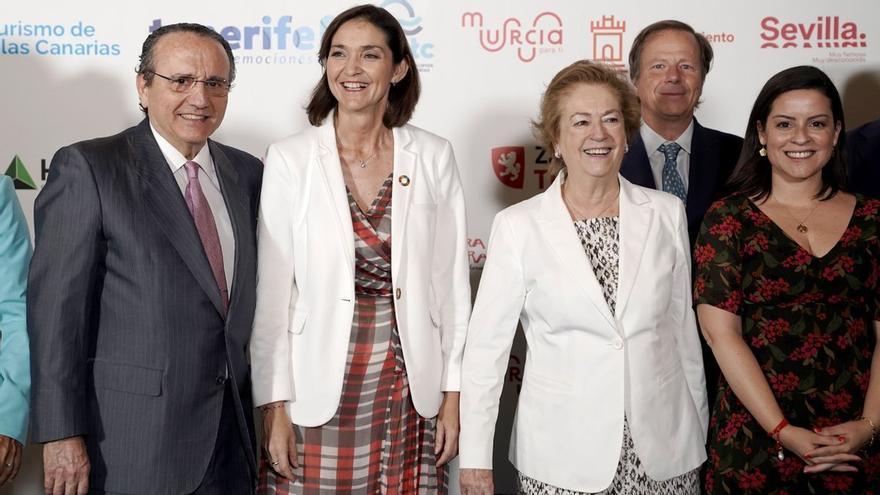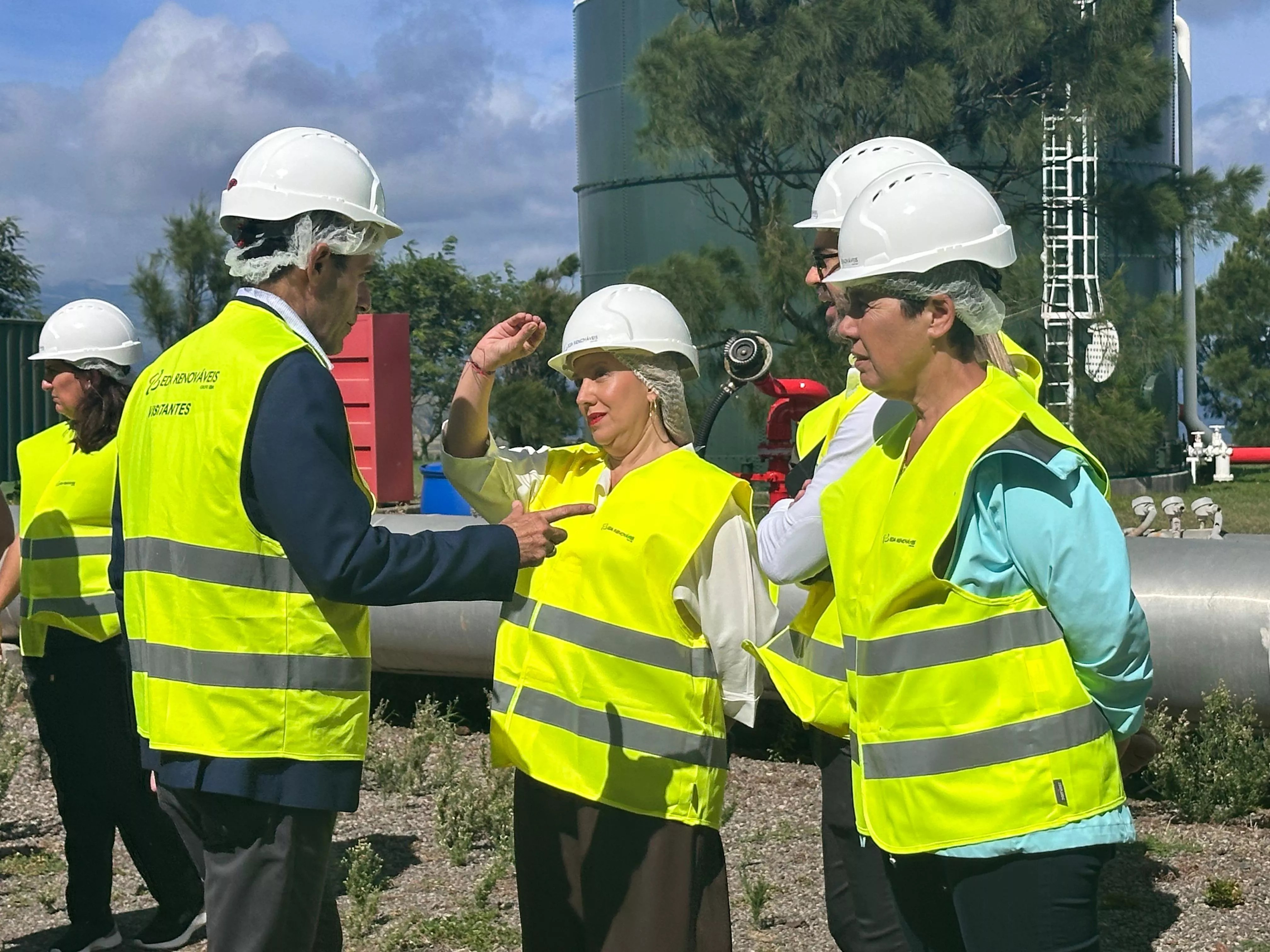
The Minister of Industry, Commerce and Tourism, Kings Marotoclosed this Wednesday the launching ceremony of the new edition of ‘Sneak Close‘, the post about sightseeing of the group Iberian Press, to which this newspaper belongs. In his speech before some 120 people at the Casa de América in Madrid, Maroto detailed some of the challenges facing the sector and the investments that the Government is making to promote it. The event brought together a large institutional representation from various autonomous communities, official bodies dedicated to tourism promotion, sectoral organizations and leading private companies active in tourism, sports and leisure.
“When we talk about tourism in Spain, the international attracts attention, but the domestic one also has an important role,” said the minister, who described internal travel as “an upward trend” that in 2021 increased “more than one 111%” and saw spending grow “207%”. Maroto highlighted the positive “indicators”, among which “employment” stands out as “main thermometer of recovery”.
The minister focused on the need to “not settle for going back to the pre-pandemic point”, considering that “the crisis of the coronavirus has served to reflect” on “a change of model” before which it is necessary “to continue improving competitiveness”.
As a review of the Government’s plans, Maroto detailed the “investment of more than 3.4 billion of the Next Generation funds” in items among which the tourism sustainability plans stand out as “the most ambitious that are being deployed”.
Maroto threw a affectionate message to Prensa Ibérica and its work making known the different territories of Spain. “You contribute to promoting the attraction of national tourists to our destinations and remind us of the potential of our offer”, concluded Maroto, in words addressed to the president of the communication group, Javier Moll.
Moll: “Spain is an open-air museum”
Minutes before, Moll had opened the event by assuring that in Spain “we are lucky to have such a wide and appealing variety of destinations” and highlighting the importance of the “sector that has contributed the most wealth in the last decade, and that acts as a lever for restaurants, sports or culture”.
“There is no town where the traveler does not find jewels, places to escape to”, assured the president of Prensa Ibérica, who described Spain as “an open-air museum”, praising the fact that it is “the third country with more places World Heritage”.
Moll stressed the importance of “the signs that point to a clear recovery”, since “pre-covid levels could be exceeded this year” despite the “unprecedented collapse” in the hardest part of the coronavirus. “Employment is already in figures prior to the pandemic”, he detailed, considering that “11 months of growth in foreign tourists” have accumulated.
The president of Prensa Ibérica explained the role of ‘Escápate Cerca’ as “the most complete and fastest way to prepare trips without leaving Spain”, with the promotion of national tourism as one of its objectives, hand in hand with “the reference publication in the sector”such as Viajar magazine, belonging to the same publishing group.
“Vindicate the tourism industry”
The event was attended by authorized voices on the matter, who participated in two round tables. The first gave rise to an enriching conversation about the challenges and opportunities of local tourism, and the president of the Cabildo de Tenerife, Pedro Martín; the Minister of Tourism of the Canary Islands, Yaiza Castilla; the Secretary General of the Tourism Board, Carlos Abella; the General Secretary of the Spanish Confederation of Hotels and Tourist Accommodation, Ramón Estalella, and the Deputy General Director of Foreign Marketing of Turespaña, Enrique Ruiz de Lera.
Martín began by highlighting the “uncertainty” of a moment in which “the concern coincides with employment data that had not been so good for 13 years.” Abella added that “you are beginning to notice the effects of the economic crisis”, with “a containment in reserves and the number of days”, although he was in favor of raising a “necessary optimism after the two toughest years in history”.
“Last year tourism saved us and we want to continue betting on it,” said Castilla, before Ruiz de Lera bet on thinking “how to continue to be the world’s favorite destination in a sustainable way.” Precisely, sustainability was one of the key topics of the day, considering, in the words of Martín, that “we must know how to connect with the interests of visitors and with their environmental sensitivity” without neglecting the “very important” work of administrations and hoteliers and claiming “the industry, not as a problem but as one of the great needs”.
Among the challenges, the change in the tourism model highlighted by Abella stands out (“before many people went on vacation for a month, now they go for less time, but 5 or 7 times a year”) and the difficult balance between the aspects of sustainability , “environmental, social and economic” pointed out by Estalella and corroborated by several of the speakers.
Successes and challenges in sustainability
Precisely, sustainability focused the ssecond discussion table, in which the vice-president of the Association of Tourist Municipalities of the Canary Islands, Onalia Bueno; the councilor for Culture, Tourism and Sports of the Murcia City Council, Pedro José García Rex, the general director of the ICT, Fernando Fraile; the manager of the Spanish Confederation of Travel Agencies, Mercedes Tejero and the biologist Marta Mújica.
“There is still a long way to go”, assured García Rex, after affirming Bueno that “we need a lot more resources and a strategic program” for such a task. Mújica, however, wanted to emphasize that “it is no coincidence that Spain is a leader in promoting the European Charter for Sustainable Tourism”.
The speakers lamented the “difficulties” in carrying out this mission, making clear, in the words of Fraile, a request to public administrations to “help implement sustainability standards”. “We have been the sector hardest hit by the crisis”, added Tejero, after which Mújica ruled that “it is important to reach agreements.” “The public infrastructure must be at the same level as the private,” concluded Bueno.
“Sustainability, like Madrid and Nadal”
The anecdote of the day came from the hand of Fraile, who assured that “sustainability would be like real Madrid Y Rafael Nadal”, praising the reliability of both in their sports competitions, after which he opted to make “sustainability in its triple aspect” “certifiable”.
Finally, as future goals, Tejero stressed that “the challenges are going to be marked by the tourists” and Mújica certified the importance of “listen to young people” in the face of a “world that changes very quickly” and in which “unfortunately the forecasts around the climate change”.















